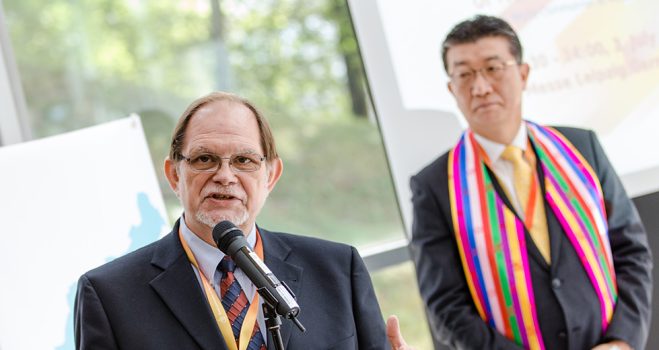The need for urgent ecumenical responses to the dangerously escalating tensions on the Korean Peninsula was the focus of a meeting of the Ecumenical Forum for Peace, Reunification and Development Cooperation on the Korean Peninsula (EFK) held in Leipzig, Germany on 7-8 July.
Thirty-two people from churches and related organizations from the Democratic People’s Republic of Korea (DPRK), the Republic of Korea (South Korea) and seven other countries took part in the meeting, which was hosted by the World Communion of Reformed Churches (WCRC).
The EFK was launched in 2006 as a network of churches, national councils of churches, mission organizations and church-related development agencies in cooperation with the World Council of Churches (WCC), Christian Conference of Asia (CCA) and other ecumenical bodies, and is convened and moderated by the WCC.
The discussions in Leipzig built upon the long history of the ecumenical movement’s engagement and accompaniment of Christians from both North and South Korea in their search for peace and reunification after more than 70 years of division.
Delegations from the Korean Christian Federation (KCF) from North Korea and the National Council of Churches in Korea (NCCK) from South Korea provided key information, analysis and recommendations. This provided a basis for the group’s discussions on the prospects for and potential impact of a peace treaty for the Korean Peninsula, and on how to deepen mutual cooperation in efforts to reduce tensions and conflict risks and to promote peace and reconciliation.
Representatives of KCF criticized the cycle of confrontation with the United States as increasingly hostile and demanded the abolition of sanctions against North Korea. They expressed concern that, at any time, a nuclear war might break out. They expressed gratefulness for all peace efforts from the churches, stressing that peace on the Korean Peninsula and world peace are closely intertwined.
Rev. Kim Young Ju, NCCK general secretary, also called for definitive steps toward peace: “To promote the making of an actual peace treaty is essential,” said Kim Young Ju, adding: “Unless we have a peace treaty, the problem will become catastrophic.”
“At the same time”, Kim Young Ju said, “economic, military and cultural sanctions by the United Nations against North Korea should be removed. These sanctions have a negative rather than a positive effect on the work for peace, and they affect innocent people in North Korea the most”.
Rev. Dr Chris Ferguson, general secretary of the WCRC, said “We have a longstanding commitment with the Korean Peninsula. In a resolution adopted on 7 July at the end of a nine-day meeting in Leipzig, the WCRC’s General Council agreed to develop an ’Ecumenical Accompaniment Process for Healing, Reconciliation and Peaceful Reunification of the Korean Peninsula’ involving different initiatives of global, regional and national ecumenical councils.”
Ferguson concluded, “We cherish the longstanding ecumenical accompaniment of the relationship, dialogue and exchange between Christians from North and South Korea, as a rare and now possibly unique resource for peace in the region.” He added: “It is an emblematic expression and example of the ecumenical Pilgrimage of Justice and Peace.”
Peter Prove, moderator of the meeting and director of WCC Commission of the Churches on International Affairs (CCIA), reported on a meeting by a delegation led by WCC general secretary Rev. Dr Olav Fykse Tveit with the newly-elected president of South Korea, Moon Jae-in, in Seoul on 30 May 2017. In this meeting, said Prove, “the delegation presented information on the ecumenical movement’s longstanding and continuing efforts for peace and reconciliation in the region, and President Moon reaffirmed his commitment to new initiatives for dialogue with North Korea.”
Prove also referred to a recent statement by the WCC Executive Committee that “confrontation by military or other means carries far higher risks of conflict – with catastrophic consequences for all people of the Peninsula and the region – than prospects of leading to peace. A sustainable peace, and the peaceful denuclearization of the region, cannot be achieved through mutual provocation, but only through dialogue. In this particularly dangerous moment, self-restraint is indeed all that separates armistice and war. We call on all parties to beware of this perilous threshold.”
The WCRC and the WCC encourage all member churches around the world to observe the Sunday before 15 August each year – in 2017, Sunday 13 August, as a “Sunday of Prayer for the Peaceful Reunification of the Korean Peninsula.”
(Article courtesy of the World Council of Churches; Image by Anna Siggelkow)


